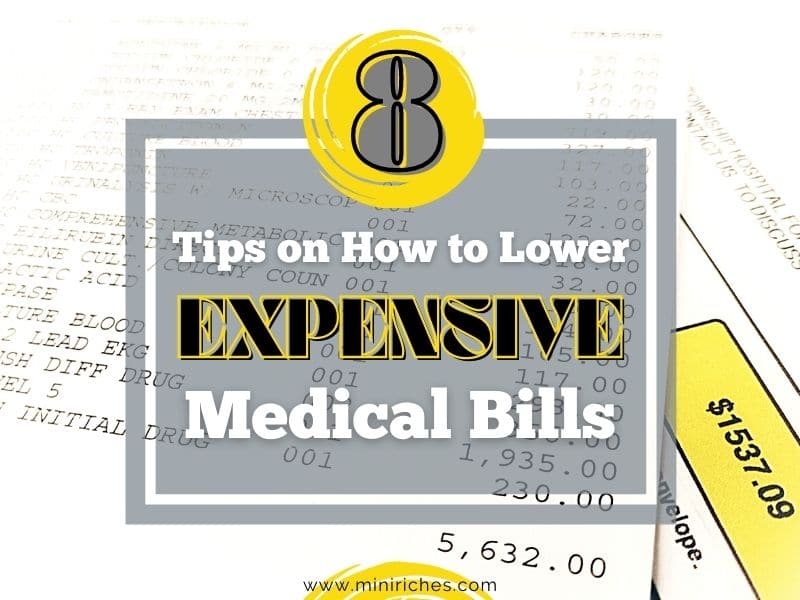
How to Lower Expensive Medical Bills: 8 Tips
There’s nothing quite like racking up several thousand dollars in expensive medical bills. It doesn’t matter if you’re living that chaste, single life or have an epically large family like us. You’ll be smacked in the face with expensive medical bills at least once. I can promise you that! We’re a growing family of eight, so of course, we’re experts when it comes to navigating expensive medical bills.
Here are our tips to reduce expensive medical bills:
- Review an itemized copy of your bill.
- Ask the billing office if they offer any rebates.
- Don’t be afraid to ask about financial assistance.
- Be sure expensive medical bills are filed with your insurance provider and that they have the correct information on file.
- If possible, plan expensive procedures around your deductible.
- Pay your bills on time.
- Make sure you are filed as self-pay if you do not have insurance.
- Choose not to use your health insurance.
The costs alone of going through six pregnancies add up to a small fortune. We once took one of our boys to the emergency room at the advice of medical personnel because we thought he had appendicitis. After some testing and x-rays, the results concluded that he had strep throat and was extremely constipated.
That was an expensive way to find out our eight-year-old son needed antibiotics and a good poop.
Over the years, we’ve also had expensive medical bills for stitches, more x-rays, dislocated elbows, custom orthotic inserts for a severe case of flat feet, and outpatient surgeries. The average cost for braces is $5,000 to $6,000, and it’s looking like we’ll be going down that road with a few of our kids over the next several years as well.
Some bills are pretty solid and non-negotiable. Some bills have wiggle room, especially if you discover that the billing office over-charged or miss-coded your bill. More often than not, it’s up to you and you only to uncover any potential billing discrepancies.
We’ve found a few tricks here and there to help us lower our expensive medical bills—sometimes by a little, other times by a lot.
7 Tips on How to Lower Expensive Medical Bills
1. Review your bill with a fine-tooth comb.

Often the initial bill is sent in a lump sum format. If this is the case, call the billing office and request an itemized bill be sent to you. An itemized bill has the total price broken down into individual items. Once you receive the itemized bill, you’ll be able to go over the bill and look for any possible discrepancies with the types of procedures and medicines that were provided against what you are being charged.
You can call your insurance and have them clarify any medical code or cost you may have questions about. Next, call the billing office at the medical provider and ask them to audit the items in question.
We received a substantial amount of bills after our fourth child was born. After talking with friends about their pregnancy bills, we concluded that our bill was still quite large—even after insurance.
Our efforts to keep our expensive medical bills in check led us to bust out our fine-tooth comb. We called the billing office and had an itemized bill sent through the mail. Would you believe they charged us $110 for one of those hospital gowns? The crazy part is my wife didn’t even get to keep it!
We continued combing and found out they were also billing us over a thousand dollars for having to give our newborn son oxygen six times. They did so in a separate room after they wheeled him away to do something else, and we were never informed this happened (don’t get me started).
There were other discrepancies, so we called and had the hospital audit our bill. After the billing department completed the audit, we were informed they had made many billing errors, and our bill was reduced by several hundred dollars.
2. Ask the billing office if they offer any rebates.
Hospitals and some medical offices offer a percentage off your bill if paid in full within a specific time frame. We’ve received anywhere between 5% to 15% off our expensive medical bills by taking advantage of these programs.
Our zero-based budget has also helped us become disciplined enough in our finances that we can use our credit card to pay off expensive medical bills. This allows us to further take advantage of the cashback feature with our credit card. We then pay off the credit card with our cash on hand to avoid the interest charges.
I feel it’s important to note here that using a credit card to pay off expensive medical bills takes a level of discipline. This strategy might not be an excellent idea for you, and you know who you are.
3. Don’t be afraid to ask about financial assistance.

Most medical bills come with this information and the application all in one letter. If it isn’t in your first bill, call the billing office and find out if they offer financial assistance and how you can apply. Your income bracket and the number of people in your family will play into the amount of aid you can expect to receive.
It can be a bit of a hassle gathering pay stubs from the last three months to prove income, but when facing expensive medical bills, the work you put in to qualify for financial assistance can be immensely worth it.
We went through a summer where we were up to our necks in expensive medical bills. We were able to have the majority of them reduced by about 70% because the hospital offered assistance based on family income.
There was only a small snippet on the bill about the aid program.
I’m glad my wife called the hospital and inquired about it. Applying for this program saved us several hundred dollars.
4. Be sure expensive medical bills are filed with your insurer, and the correct information is on file.
The medical facility may have your insurance information on file, but that doesn’t make clerical error unavoidable. There have been times we’ve received bills directly from hospitals that were not first run through our health insurance.
Our health insurance switched to a new provider while in the middle of a few procedures for a second son. A couple of months later, we both hit the floor when we received the expensive medical bills and found he was denied coverage.
We investigated and found our new insurance provider made a mistake when they typed in our son’s date of birth into their system. Once we straightened that out, we had to ask the medical facility to file the bill through our insurance again, and everything went through successfully. Phew! Our bank account was happy about that one!
5. Plan expensive procedures around your deductible if possible.
Try to plan pregnancy and elective procedures around deductibles! Deductibles typically reset at the beginning of each year. Your insurance provider will be able to tell you when your deductible resets. You will likely meet your out-of-pocket max with pregnancy appointments and the hospital bill for the birth. Use it to your advantage instead of letting it take advantage of you.
Experience is a good teacher, but she sends in terrific bills.
—Minna Antrim
We had already met our deductible during our fourth pregnancy through all the office visits for the first seven months and other medical bills throughout the year. Our son was born two months and a few weeks into the new year, and our deductibles reset back to $0 after January 1st.
This crossover meant that instead of paying the 70/30 co-insurance split on the hospital bills for our son’s birth, we first had to meet his several thousand dollar deductible again. THEN our insurance kicked in to cover some of the remaining expenses. In short, we were on the hook for more than $10,000 in out-of-pocket deductibles between Angela and our fourth son because the pregnancy crossed over January 1st.
Let me pause here to say expensive medical bills suck!
Had the pregnancy been within one calendar year, we still would have paid our entire deductible, but the rest of the expenses would have been covered under the 70/30 split for co-insurance, and we wouldn’t have had to pay the deductible twice for the same pregnancy.
6. Don’t let expensive medical bills become delinquent.
This tip might sound like common sense talking, but nothing good will ever come from ignoring your financial obligations. Depending on the laws in your state, unpaid medical bills can accumulate interest and late fees, negatively affect your credit, and lead to phone calls with aggressively annoying collection agencies.
Rather than blowing off your expensive medical bills, you can attempt to negotiate a payment plan that fits within your monthly budget and income limits. You can also request a waiver of interest as long as you consistently make the agreed-upon monthly payments.
Consistently making the agreed-upon monthly payments means not paying late!
Do yourself a favor and spend a couple of minutes creating a monthly bill pay checklist that will help you keep up with the due dates of all your bills. If you’d prefer to have someone make this checklist for you, then you can grab ours here.
7. What if you don’t have health insurance?
Let the medical office know at the time of your appointment if you do not have insurance. Doing so is very important! Medical offices have self-pay categories. The fees tend to differ and are considerably lower than what is billed to your insurance provider. This helps with both inexpensive and expensive medical bills. Every penny counts!
We didn’t have any health insurance coverage for a few months when I separated from the military. My wife notified the pediatrician before one of our children’s appointments, and they made sure to charge us as self-pay. Usually, we would have received a bill for $90 after insurance negotiated their allowable amount to be billed. This time, we only paid approximately $55 through self-pay.
8. Choose not to use your insurance.

I recently spoke to a financial advisor at a local woman’s OB/GYN office, and she confirmed that the self-pay category is much less expensive than what is billed through insurance if the following apply:
- You have a large deductible
- There are no foreseeable expensive medical bills on the horizon
- You are at the end of the year with a long way to go until you meet your deductible.
In any of the above three cases, it may benefit you from choosing the self-pay category rather than having the medical bill run through your insurance provider.
Consumer Reports expands on how and why paying your doctor in cash may save you money. They also fill you in on potential drawbacks if you choose cash over filing through your insurer.
You have to weigh the benefits or consequences as it pertains to your situation.
Final thoughts on how to lower expensive medical bills.
Expensive medical bills are inevitable, but such is life. The best we can do is to try to avoid getting sick or hurt. When doing so is unavoidable, we can at least try to look for ways to ease the burden of expensive medical bills by using the tips mentioned above.
Have you had the unavoidable misfortune of receiving a large medical bill? How did you get your bill reduced? Know someone who could benefit from these helpful tips? Share your favorite insider tips or crazy stories in the comments, and then share us with your friends and family!

These are great tips! It’s so important to review bills before paying. You never know if a wrong billing code or services was included. Thanks for sharing these.
I couldn’t agree more! I’m always surprised with how many folks blindly give their hard-earned money away without first understanding where it’s going!